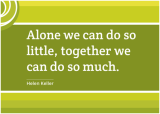“I dream of a day when […] volunteering is just a natural thing – not something exceptional or something that makes us feel particularly noble. Just something that we do. Something that connects us with one another. It is the only way we, as individuals, will ultimately make a real difference.” Arianna Huffington, Thrive
The Community Circles facilitator is an unpaid role, but that certainly does not mean it is unvalued or unimportant. Quite the contrary, the role of the facilitator is absolutely integral to the functionality and the ultimate success of every circle. With this in mind, central to our approach of recruiting and supporting facilitators is the concept of reciprocity. We seek to provide effective, meaningful volunteering opportunities to people from a wide spectrum of backgrounds, communities and professions, which will not only serve their altruistic purpose and allow people to donate their time to support someone in their community, but will also provide each individual who volunteers with prospects for self-development, a great intrinsic satisfaction, as well as the opportunity to foster and develop their own personal connections and networks.
In the past, we have recruited facilitators from universities, faith communities, businesses and other provider organisations. Facilitators do not require any qualifications or prior knowledge of person-centred practices to be successful, they should simply possess a willingness to make a positive contribution to their community, and be prepared to learn and develop new relationships. One of the most wonderful aspects of a Community Circle is its individuality; every circle has a different purpose, and the unique personality of the facilitator, as well as the individual talents, gifts and skills of the circle members, support the circle to achieve this purpose in a multitude of ways.
As a result of our work with businesses and provider organisations, we see the recruitment of Community Circles facilitators as integrating effectively into the corporate social responsibility strategies of these organisations. Conventionally, businesses in particular have measured success on two very narrow metrics, quite often their maintenance of a position of relative power and financial gain. Arianna Huffington, the author of Thrive, challenges us to reconceptualise our understanding of what it means to be successful, and presents a so called ‘third metric’ through which we should also measure our success. Within the third metric, Huffington identifies four elements, namely, wellbeing, wisdom, wonder and giving, which should all contribute to our measurements of success. In her own beautiful words, Huffington describes the importance of broadening our understanding of success. Taken from Thrive, she writes,
“We have increasingly come to realise […] that there are other dimensions to living a truly successful life. And these dimensions, the four pillars of the third metric, impact everything we do and everything we are, from our health to our happiness. As a result, something as vast and epic as the destiny of humanity depends on something as intimate and personal as the shape of our individual lives – the way each one of us chooses to live, think, act, and give.”
At Community Circles, we view such a realisation as extremely pertinent, and have tailored our engagement with businesses and other provider organisations to support the implementation of a third metric of success. By allowing members of staff to train as Community Circles facilitators, innovative organisations are realising that success for their staff should be measured much more broadly than on the two prototypical parameters of power and wealth. In particular, we believe that the manifestation of giving throughout an organisation and therefore into the wider community, can have so many positive benefits to staff morale, employee skill development and general contentedness throughout a given organisation. Circles have an incredibly positive influence on the lives of all the people who are involved with them, and this includes the facilitator.
Indeed, research into corporate social responsibility and the benefits of staff volunteering in the UK supports our thinking. A report by Corporate Citizenship in 2010, found that by supporting employees to volunteer regularly, individuals developed a number of key skills that were transferrable to their roles. An improvement in communication skills, the ability to coach and support others, adaptability, influencing and negotiation skills were all listed by staff as skills that they developed as volunteers. However, it is not just employees of businesses that could benefit from becoming a circle facilitator. We have found that University students, particularly those studying in the field of health and social care, can gain vital experience working with families that can support them in their search for gainful employment after the end of their course. We also know that facilitating a circle is a great way for members of faith communities to live out their faith and support people across their community networks.
We know that circles can bring so much to so many different people, which is exactly why we are so passionate about developing circles at scale, across the UK, to make them easily available to absolutely everyone who wants one. In order to achieve this, we are developing relationships and partnerships with partner organisations, community groups and businesses, in order to expand our presence and support the development of circles as widely as possible.




